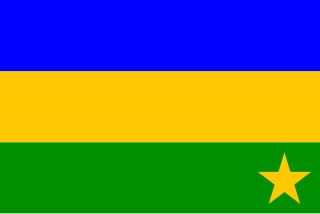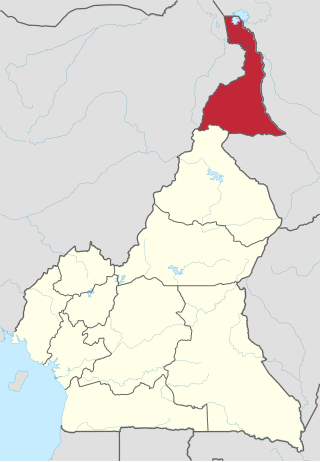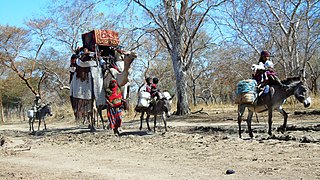
The Kanuri people are an African ethnic group living largely in the lands of the former Kanem and Bornu Empires in Niger, Nigeria, Chad, and Cameroon, as well as a diaspora community residing in Sudan. Those generally termed Kanuri include several subgroups and dialect groups, some of whom identify as distinct from the Kanuri. Most trace their origins to ruling lineages of the medieval Kanem–Bornu Empire, and its client states or provinces. In contrast to the neighboring Toubou or Zaghawa pastoralists, Kanuri groups have traditionally been sedentary, engaging in farming, fishing the Chad Basin, trade, and salt processing.

Islam is the largest and the state religion of the Islamic Republic of Pakistan. Pakistan has over 231.6 Million adherents of Islam. As much as 90% of the population follows Sunni Islam and around 97% of Pakistanis follow Islam. Most Pakistani Sunni Muslims belong to the Hanafi school of jurisprudence, which is represented by the Barelvi and Deobandi traditions.

Islam is the third largest religion in Sri Lanka, with about 9.7 percent of the total population following the religion. About 1.9 million Sri Lankans adhere to Islam as per the Sri Lanka census of 2012. The majority of Muslims in Sri Lanka are concentrated in the Eastern Province of the island. Other areas containing significant Muslim minorities include the Western, Northwestern, North Central, Central and Sabaragamuwa provinces. Muslims form a large segment of the urban population of Sri Lanka and are mostly concentrated in major cities and large towns in Sri Lanka, like Colombo. Most Sri Lankan Muslims primarily speak Tamil, though it is not uncommon for Sri Lankan Muslims to be fluent in Sinhalese. The Sri Lankan Malays speak the Sri Lankan Malay creole language in addition to Sinhalese and Tamil.

Islam is the most widespread religion in Bosnia and Herzegovina. It was introduced to the local population in the 15th and 16th centuries as a result of the Ottoman conquest of Bosnia and Herzegovina.

The Kirdi are the many cultures and ethnic groups who inhabit northwestern Cameroon and northeastern Nigeria.

The Far North Region, also known as the Extreme North Region, is the northernmost and most populous constituent province of the Republic of Cameroon. It borders the North Region to the south, Chad to the east, and Nigeria to the west. The capital is Maroua.

Estonia has a small, but growing Islamic community. According to 2024 estimates, the number of people who profess Islam was 10,000 in Estonia, or 0.72% of the total population. The number of practicing Muslims is small and, in the absence of a mosque, the Estonian Islamic Centre serves as a center of worship.

Cameroon is a Christian majority nation, with Islam being a minority faith practiced by around 30.6% of the total population as of 2022. Among Cameroonian Muslims, approximately 27% identify themselves as Sunni, 2% Ahmadi and 3% Shia, while the majority of the rest do not associate themselves with a particular group and sect.

Religion in Nepal encompasses a wide diversity of groups and beliefs. Nepal is a secular nation and secularism in Nepal under the Interim constitution is defined as "Religious and cultural freedom along with the protection of religion and culture handed down from time immemorial." That is, "The state government is bound for protecting and fostering Hindu religion while maintaining "Religious" and "Cultural" freedom throughout the nation as fundamental rights.

Islam in Africa is the continent's second most widely professed faith behind Christianity. Africa was the first continent into which Islam spread from the Middle East, during the early 7th century CE. Almost one-third of the world's Muslim population resides in Africa. Muslims crossed current Djibouti and Somalia to seek refuge in present-day Eritrea and Ethiopia during the Hijrah ("Migration") to the Christian Kingdom of Aksum. Like the vast majority (90%) of Muslims in the world, most Muslims in Africa are also Sunni Muslims; the complexity of Islam in Africa is revealed in the various schools of thought, traditions, and voices in many African countries. Many African ethnicities, mostly in the northern half of the continent, consider Islam as their traditional religion. The practice of Islam on the continent is not static and is constantly being reshaped by prevalent social, economic, and political conditions. Generally Islam in Africa often adapted to African cultural contexts and belief systems forming Africa's own orthodoxies.

Islam in Madagascar is a minority religion, with most Malagasy people adhering to Christianity. Due to the secular nature of Madagascar's constitution, Muslims are free to proselytize and build places of worship in the country.

The Sao civilization flourished in Central Africa from ca. the 6th century BCE or 5th century BCE to as late as the 16th century AD. The Sao lived by the Chari River basin in territory that later became part of Cameroon and Chad. They are the earliest civilization to have left clear traces of their presence in the territory of modern Cameroon. Sometime around the 16th century, conversion to Islam changed the cultural identity of the former Sao. Today, several ethnic groups of northern Cameroon and southern Chad, but particularly the Sara and Kotoko, claim descent from the civilization of the Sao.

The Musgum or Mulwi are a Chadic ethnic group in Cameroon and Chad. They speak Musgu, a Chadic language, which had 61,500 speakers in Cameroon in 1982 and 24,408 speakers in Chad in 1993. The Musgum call themselves Mulwi.

The Hausa are a native ethnic group in West Africa. They speak the Hausa language, which is the second most spoken language after Arabic in the Afro-Asiatic language family. The Hausa are a culturally homogeneous people based primarily in the Sahelian and the sparse savanna areas of southern Niger and northern Nigeria respectively, numbering around 86 million people, with significant populations in Benin, Cameroon, Ivory Coast, Chad, Central African Republic, Togo, Ghana, as well as smaller populations in Sudan, Eritrea, Equatorial Guinea, Gabon, Senegal, Gambia. Predominantly Hausa-speaking communities are scattered throughout West Africa and on the traditional Hajj route north and east traversing the Sahara, with an especially large population in and around the town of Agadez. Other Hausa have also moved to large coastal cities in the region such as Lagos, Port Harcourt, Accra, Abidjan, Banjul and Cotonou as well as to parts of North Africa such as Libya over the course of the last 500 years. The Hausa traditionally live in small villages as well as in precolonial towns and cities where they grow crops, raise livestock including cattle as well as engage in trade, both local and long distance across Africa. They speak the Hausa language, an Afro-Asiatic language of the Chadic group. The Hausa aristocracy had historically developed an equestrian based culture. Still a status symbol of the traditional nobility in Hausa society, the horse still features in the Eid day celebrations, known as Ranar Sallah. Daura is the cultural center of the Hausa people. The town predates all the other major Hausa towns in tradition and culture.

Christianity is the majority religion in Cameroon, with significant minorities of the adherents of Islam and traditional faiths.

The population of Chad has numerous ethnic groups. SIL Ethnologue reports more than 130 distinct languages spoken in Chad.
The main religion in Morocco is Sunni Islam, which is also the state religion of the country. Officially, 99% of the population are Muslim, and virtually all of those are Sunni. The second-largest religion in the country is Christianity, but most Christians in Morocco are foreigners. There is a community of the Baháʼí Faith. Only a fraction of the former number of Maghrebi Jews have remained in the country, many having moved to Israel.

The main religions that exist or historically existed in Kurdistan are as follows: Sunni Islam & Shia Islam. Overall today, Sunni Islam is the most adhered to religion in Kurdistan.

The Massa people, also called Masana, Banana, or Yagoua are a Chadic ethnic group in Cameroon and Chad. They are often grouped together with several together ethnic groups, who are collectively referred to as the Kirdi people.

The Mandara people, also known as Wandala or Mandwara, are a Central African traditionalist ethnic group found in north Cameroon northeastern Nigeria, and southeastern Chad. They speak the Wandala language, which belongs to the Chadic branch of Afro-Asiatic languages found in northeastern Africa.


















